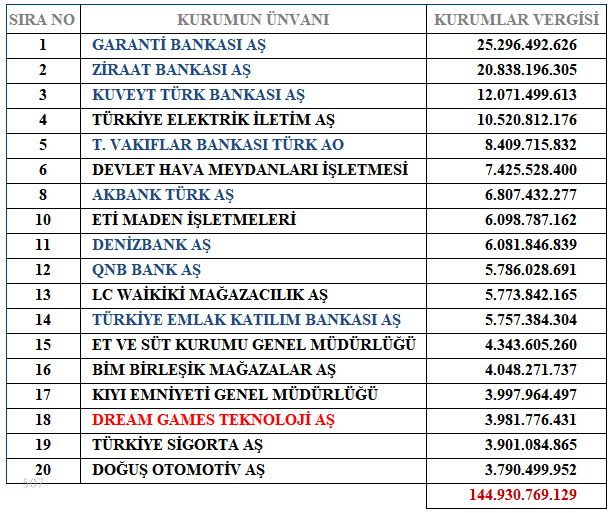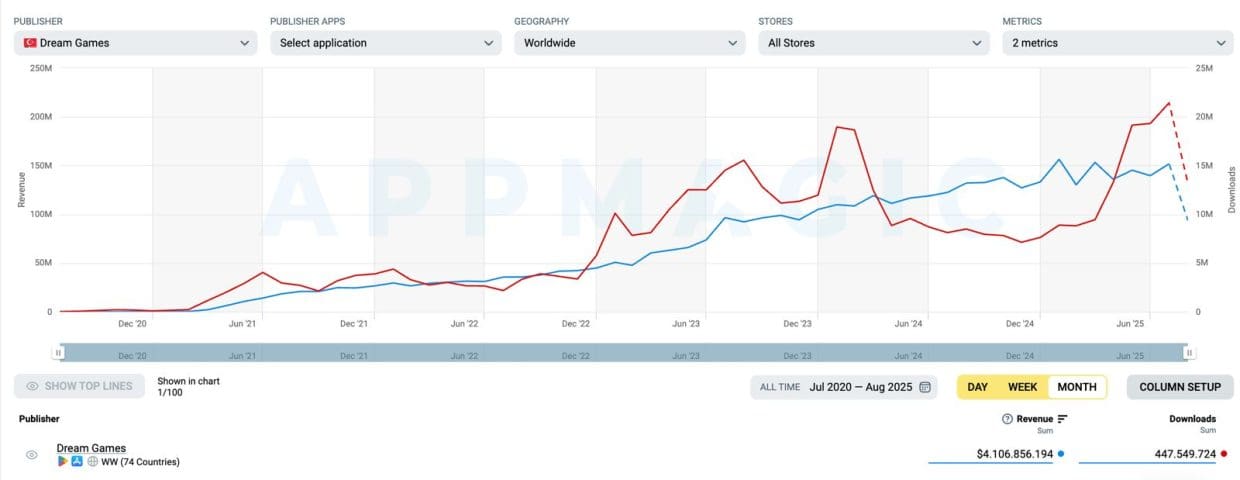
- arrow_back Home
- keyboard_arrow_right Highlights
Dream Games Paid $100M, Türkiye’s 18th Biggest Taxpayer in 2024
HighlightsJournal 240 Gamigion August 20
The Turkish Ministry of Treasury and Finance has released the 2024 list of top corporate taxpayers, and Dream Games has officially joined the country’s financial elite. Istanbul-based mobile gaming giant ranked 18th, paying 4 billion TRY in corporate tax.
As of 2021, the corporate tax rate in Türkiye is 22%.
There’s only one true technology company on this entire list.
(1) Unregulated: No state protection or monopoly advantage.
(2) Global-first: Building for the world, not just for Türkiye.
Founded in Istanbul in 2019 by Soner Aydemir (now CEO), İkbal Namlı, Hakan Sağlam, Eren Şengül, and Serdar Yılmaz, Dream Games has quickly risen to become one of Türkiye’s most prominent mobile game studios. The company has reached global audiences with smash-hit titles such as Royal Match and Royal Kingdom, both of which have resonated worldwide.
In just five years, the company has created hundreds of jobs, contributed millions in social security premiums, and even attracted world-class investors to Türkiye. Dream Games is proof of the immense value startups and tech companies can bring to the country — if only we prioritize meritocracy, rule of law, and clear regulations to unlock their full potential.
And here’s a thought: could Dream Games’ decision to skip technopark tax incentives, and still pay this much, be a sign of uncertainty around how tax and legal frameworks are applied?

In May, Dream Games announced that it had secured a fresh investment from European private equity giant CVC. While the financial details of the deal were not disclosed, the partnership signals continued confidence in the studio’s long-term growth and international ambitions.
To put that into perspective:
- Dream Games’ tax bill equals to almost $100 Million.
- That’s not revenue, not profit, but just the tax they paid!
For comparison, Dream Games sits shoulder to shoulder with retail and banking giants like LC Waikiki, BİM, and QNB Bank.
What This Means for Dream Games
Dream Games is already known globally as the studio behind Royal Match, one of the most successful puzzle games of the decade. The company has repeatedly topped app store charts, and its revenues have consistently placed it among the world’s top mobile publishers.
Now, this tax ranking proves something more:
- Dream Games is no longer just a breakout unicorn; it’s a pillar of Türkiye’s economy.
- Very few technology or gaming companies appear on this list, dominated by banks, energy firms, and state-run enterprises.
Being the only pure-play gaming company in the top 20 highlights just how much Dream Games has scaled in terms of global reach and monetization power.

A Benchmark for Türkiye’s Tech Industry
Most of the names on the list are legacy institutions — Garanti, Ziraat, Vakıfbank, and Türk Telekom’s infrastructure arms. Dream Games’ presence signals a shift: digital-native companies are now contributing at the same level as traditional heavyweights.
For Turkey’s startup and gaming ecosystem, this is a milestone. It shows that:
- Mobile gaming can generate not only international visibility but also a massive domestic economic impact.
- With global players like Peak Games (acquired by Zynga) and now Dream Games, Istanbul is cementing itself as a global puzzle-gaming hub.
The Bigger Picture
The total corporate tax paid by the top 20 companies in Türkiye reached ₺144.9 billion (about $3.5 billion USD). Dream Games alone accounts for nearly 3% of that total.
For context:
- Banks dominate the top 10, unsurprisingly, with Garanti leading at ₺25.3 billion ($617M).
- Dream Games, in comparison, has risen in less than a decade from a startup to one of the largest single corporate contributors to Turkey’s tax base.
Why It Matters
Dream Games’ 18th-place finish isn’t just about taxes. It’s a signal to investors, founders, and policymakers:
- Tech-first companies can and will drive significant economic returns for the country.
- Mobile gaming, often underestimated, is now on equal footing with traditional industries in shaping the economy.
For Dream Games, this is not only a badge of honor but also a statement — they’ve crossed the line from startup success story to national economic powerhouse.
Takeaway?
Dream Games isn’t just playing puzzles anymore; it’s rewriting the rules of business in Türkiye.







